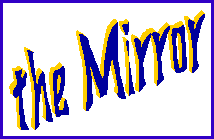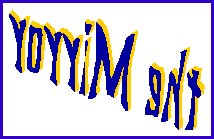|
The Mirror
By Brian Lesnik
Sometimes we have a tendency to get taken
away a bit with ourselves - and we never really notice it. Our
friends and relatives can see it but we can't appreciate what
has happened to us. The following is a legendary Chassidic story
which describes this process in detail.
In a small city in Europe many years ago,
lived a simple storekeeper named Moshe. Moshe was a kind man.
He was interested in being a good person and helping people. Moshe
had a very small store. There was little merchandise in his store
so very few people actually came to purchase from him. Moshe spent
his time sitting at the doorway waiting for a customer saying
his psalms.
Moshe had a kind heart. When people had problems,
they knew that they could turn to Moshe for help. Many poor people
would come to Moshe's store because they did not have money necessary
to purchase goods at the bigger stores, they knew that Moshe would
give them credit and a kind word. Moshe would always speak to
these poor people and cheer them up. Many times he would invite
them to his home for a meal. In fact many people knew that the
address for poor travelers was Moshe's house.
Moshe's house was a simple house. Nothing
fancy, a simple wooden floor, a few chairs to sit on, and an old
wobbly table that had been fixed often but still seemed to wobble.
Although his fare was simple, the poor travelers enjoyed Moshe's
hospitality and good cheer and always blessed Moshe for his kindness
as they left his house.
One day as Moshe was sitting on his chair
in his store saying his psalms, he noticed a stranger. An elderly
man with a long white beard and a wrinkled face. He was walking
slowly down the walk not seeming to know where he was going.
"Pardon me, sir" Moshe asked. "Can
I help you?"
"Thank you, I am traveling through this
town and I lost my money. I need a place to stay until tomorrow.
Then I will continue on my journey."
Moshe quickly invited the man to come to his
house and have a meal and to sleep over night. The elderly man
graciously accepted.
Moshe personally served the man a filling
meal and prepared the bedding accommodations for the man. In the
morning Moshe filled a sack with food and gave the man some money.
"This will pay for a coach to get you
to your destination." Moshe handed the elderly gentleman
several coins. The bearded man thanked Moshe and then blessed
him.
"May G-d open up the heavens and give
you the parnasa (livelihood) to support your family and
to help others in much greater degree than you ever dreamed possible.
Your kindness to me is exemplary and will not go unrewarded. We
shall be in touch."
The elderly man grasped Moshe's hands and
Moshe felt that a special vibrancy had just entered into him.
The man turned and left, bidding Moshe and his family good-bye.
Moshe returned that morning to his store.
It was a busy day. More people seemed to come to his store than
before. By night fall Moshe had made a profit much more than the
money that he had given to the elderly man. The next day even
more people came to his store to purchase goods. Moshe made a
handsome profit that day as well.
Each day more and more people came to Moshe's
store. Moshe began stocking more and more goods in his store.
Soon Moshe had to expand his store. He hired people to help run
his store and he added more rooms to his store to house the increased
merchandise that he now sold. But even that was not enough, the
more Moshe increased his store, the more people came to shop by
Moshe.
Soon Moshe had expanded from one small store
to a chain of several stores around the city. With many employees,
Moshe no longer found time to sit and say psalms and speak with
his customers, rather he found it necessary to open an office
away from the busy hustle of the store. There in his office, Moshe
would direct the activities of his bustling business.
Moshe still helped the poor people, but not
on the one to one friendly manner as before. Now he had a secretary
meet with those who needed help and the secretary would dispense
monies as he saw fit.
Moshe now lived in a beautiful mansion, tastefully
decorated with luxurious carpets, imported wall paper, original
oil paintings hung on the walls, and heavy velvet curtains covering
his windows. His wife had two maids to help her in the house,
even though Moshe no longer brought home guests; for he was to
busy with his flourishing business. Moshe now had a carriage and
a stable man to care for his horses. But the crown of Moshe's
possessions was a beautifully framed mirror that hung in his salon.
Mirrors in those days were very expensive, something Moshe could
never dream of in his poorer years. The large mirror was a rarity
in those bygone times, especially one so large and ornate. The
high quality of the reflection gave evidence to its exquisite
quality. Moshe treasured it above all. Often Moshe would gaze
into the mirror and see his reflection, his beautifully tailored
clothing, his furnishings and his family around him. This mirror
was Moshe's most treasured possession.
About a year after the elderly gentleman had come to visit Moshe,
he returned to the town and requested to speak to Moshe. The servant
at the house redirected the man to the office to make an appointment
since Moshe did not receive callers at his home with out first
making an appointment with the secretary. The elderly gentleman
went to the office and the secretary politely explained that Moshe
was very busy and could not see him, how ever the secretary was
prepared to help him out; what was the nature of his call?
The elderly man explained that he was a Rabbi, who had visited
Moshe and now he needed help in raising a large sum of money to
help some poor and unfortunate people in his town. The secretary
was willing to dispense some money to the rabbi but the rabbi
refused to take it, insisting that he must speak personally with
Moshe. The secretary was adamant not to permit any one to disturb
Moshe, but the more the secretary refused the rabbi entrance,
the more the bearded gentlemen insisted that he could not leave
until he spoke with Moshe personally.
Hearing the clamor from his outer office, Moshe peeked out and
was surprised to see his former guest sitting in his outer office.
Greeting him by name, the elderly man rose and looked sternly
in Moshe's eyes. Moshe, feeling the sting of the man's gaze, quickly
took the man into his inner office and apologized for the difficulties
that the man had endured.
"Moshe, what happened to you? When I left you last year you
were the kindest man I had ever met, a man to whom I blessed with
wealth. Now tell me, what has happened to you?"
Moshe was taken aback. He invited the elderly man to his home.
He served the man a scrumptious meal, with delicacies. He explained
that since he had last seen the man, his fortunes had increased
and he had truly been blessed. Moshe, beaming with pride took
the man over to the mirror that he had bought for a tidy sum of
money and showed it to the man.
"Look at this mirror! It is a true work of art. Look how
perfectly it reflects the images all around us."
The elderly man looked at the mirror. "How does it work?"
"It's very simple." Moshe explained. "This is a
piece of glass with a coat of silver on the back. The light enters
the glass, but the silver reflects it back, that's all."
The old man walked to the window and pulled back the curtain.
"Come here, Moshe. Look here! What do you see?"
Moshe walked to the window and began to gaze outside. "I
see Motle, the water carrier. Poor fellow, he can hardly make
enough money to feed his family. His wife used to come to my store
to borrow from me to make it through the week. Yes, I see also
Yente, poor thing, she is very ill, you know. She used to come
to me to borrow money to buy medicine. There is Yankel the shoemaker.
He used to talk to me when he had no business, poor fellow. He
still can't make a go of it."
"Moshe, now come to the mirror. Tell me what you see."
"I see myself with these beautiful clothing on amidst a beautiful
house."
"Moshe, do you know the difference between what you see in
a window and what you see in a mirror? The difference is the silver.
When the silver blocks your vision, you see only your self and
your possessions.
"Moshe I gave you the divine blessing for good parnassa
because I believed that you would be the perfect person to help
others. Yet the silver that you possess has corrupted your vision!"
"Rabbi, what should I do?"
"Simply remove some silver from the mirror and you will be
able to see past the silver to dthe other side."
Moshe took out his pen-knife and scrape his prize possession,
his mirror, removing some of the silver.
"Now you will be happy and you can make others happy"
said the elderly rabbi.
We too, can be happy, but we must also make others happy. Let
us not forget that we have an obligation to help out those less
fortunate than ourselves. Let us not be blinded by the silver.
~~~~~~~
from theNovember 1998Edition of the Jewish Magazine
|

